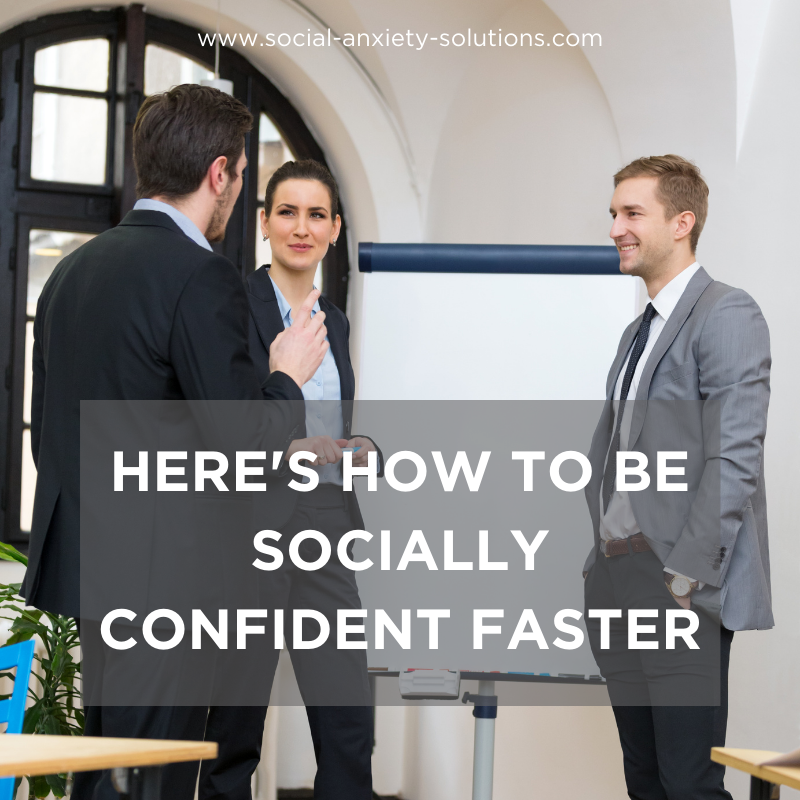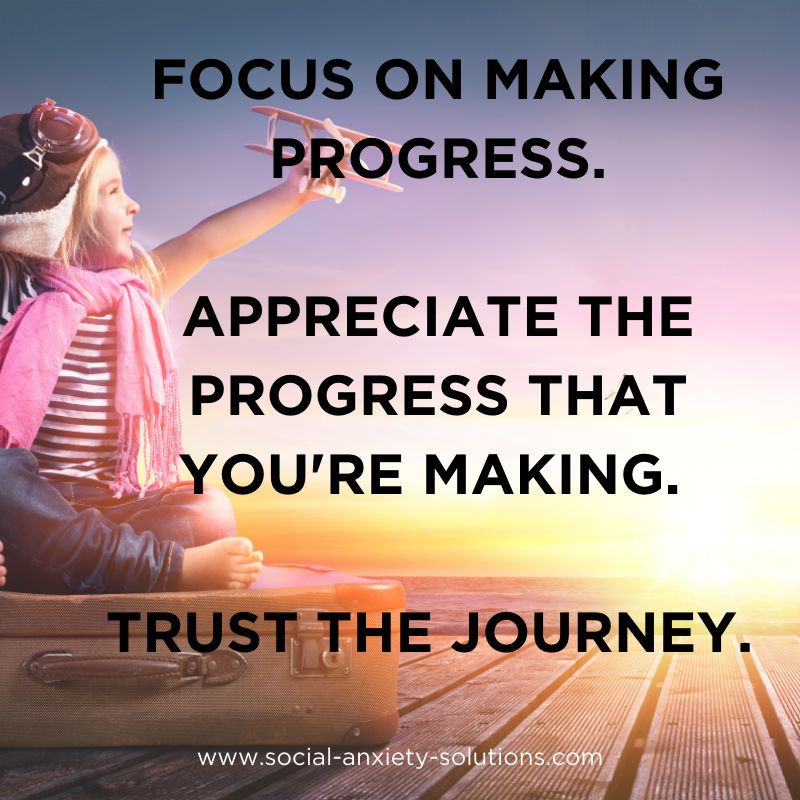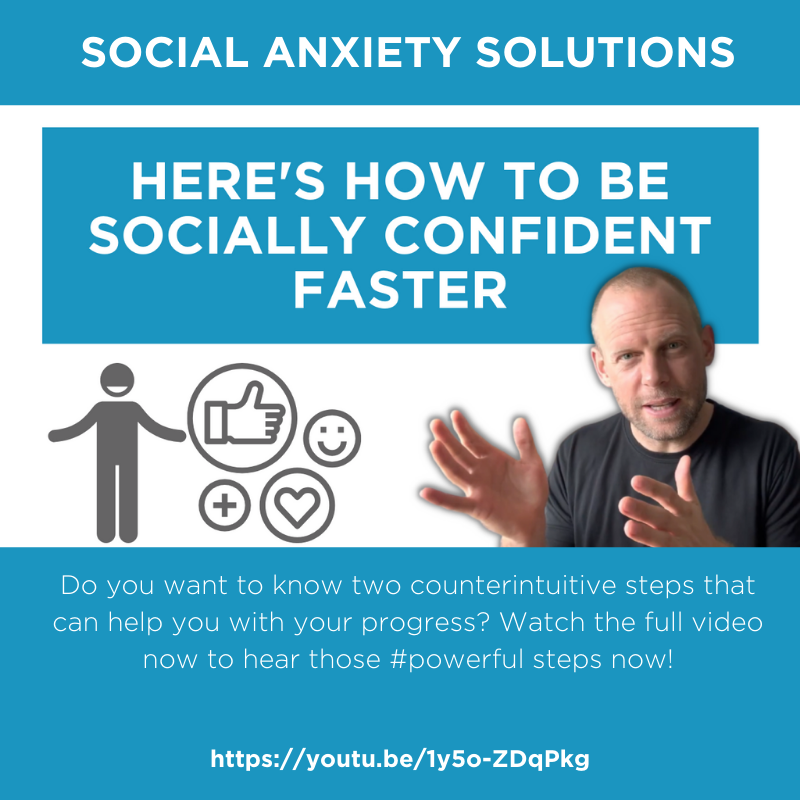SUMMARY
Do you want to speed up your journey to social confidence?
Do you want to know two counterintuitive steps that can help you with your progress?
This is what I’m going to talk about in this episode.
Watch the full video now to hear those #powerful steps now!
PS: If you are still new to my channel and want to overcome your Social Anxiety
Visit my website and register for my FREE Social Confidence Starter Kit.
Start your #JourneyToSocialEase
Go to: https://www.social-anxiety-solutions.com
FULL TRANSCRIPTION
Want to speed up your journey to social confidence?
Then there are two counterintuitive steps that you can do.
And I’m going to be talking about those in this video.
Hello, my name is Sebastiaan van der Schrier. I’m a former Social Anxiety Disorder sufferer and a Social Confidence Coach since 2009. I overcame my own Social Anxiety, and I’ve been helping others do the same.
And there’s a big problem that a lot of people with Social Anxiety suffer from once they hop on a journey to social confidence.
And this is something that I struggled with a lot myself.
And it’s very difficult to find a solution to it.
So what is it?
What’s that thing that you do that perpetuates your suffering, and that makes it worse and causes you to loop, and so on?
Well, it’s this:
Focusing on the problem.
Over focusing on your social anxiety
Constantly being obsessed about how to fix it, how to get rid of it, how to “fix yourself,” and that’s the main problem.
I mean, that’s not the main problem.
That’s the main problem that we’re talking about today that’s perpetuating the Social Anxiety issues.
Now, why is that?
Well, that’s because “What you resist persists” – Carl Jung, a famous psychologist, said that once and that’s how it is.
Because acceptance is actually a precondition for lasting change because that which you fight against keeps fighting back. So that doesn’t work.
In order to accomplish that, which you would like to accomplish, you set yourself a particular goal = social ease. And then you focus on the outcome.
And your dominant focus should be on the outcome that you’re trying to accomplish, not on the problem.
So you want to take your focus off of the problem and onto the solution.
But how the hell do you do that when you’re having such a problem with anxiety in social situations?
Because I know what it is like:
It is so limiting.
It’s so painful
You can’t stop thinking about it.
Right?
Like, “oh, what if I’m going to get anxious in this situation? Or what if this person is going to see me anxious? Oh, yesterday, this situation happened, and I got anxious, and oh, my God, what are they thinking of me? What if I run into them again? What if this problem never goes away? It feels so frustrated, I want to do this, but I can’t do that because I’ve got this crappy problem going on. This live situation here at my work is so difficult, but I can’t do anything about it because it just feels so limited. Or if I were to speak up in the way that I want to, I know that I’m going to get super anxious and tongue-tied and don’t know what bla bla bla.”
There are lots of problems to focus on.
So how the hell are you going to stop doing that?
Two counterintuitive solutions to that.
Now, these have come to me as a result of a ton of inner work. It’s not been easy. And they’re also not easy, quick-fix solutions necessarily.
Though they are the relief you’re looking for, they are the solutions you’re looking for. Okay? And I’ve managed to install these solutions within me. And it’s become an automatic mindset.
And it’s what I hope to convey to you. It’s really important.
Counterintuitive #1: Accept Everything
Counterintuitive #2: Trust The Journey
I’ll talk about each.
Let’s start with Accept Everything.
How can you accept the unacceptable?
You’re dealing with social anxiety. You’ve got all these problems. I went into it just now.
How do you accept that?
Well, you work towards accepting it.
For one, you make acceptance your goal, rather than fixing the problem.
You know, people have obsessions about certain things. Whether that’s blushing, or a facial tic, or sweating, or every day that they have some kind of a symptom sometimes, not always. But you can have that, and then you start obsessing about particular symptoms of social anxiety. For me, it was blushing.
And then you start to over-focus on it. And then it’s like, “Oh, I got to get rid of that. Once I’ll get rid of that, all my problems are gone”. – Not true at all, unfortunately.
So rather than putting your focus on trying to get rid of it, rather than having your goal try to get rid of it – make your goal accepting it. That is going to be very helpful.
And then your work is to work on the obstacles to accepting it.
So if you have say facial tic, and you’re obsessed about it like other people can see, then you’re tapping work should be focused on, “Okay, why am I not accepting it?” – That’s a question you can ask yourself, and then you get answers.
— Well, because it’s upsetting me.
Okay? You can tap on that. Why not accepting it?
— It’s frustrating to me.
Okay, tap on that. Why am I not accepting it?
— Because I hate that I’m dealing with this, tap on that.
Why you’re not accepting this?
— Because I’m angry at this fricking problem. Tap on that, etc.
Next question, how do you feel about the fact that you’re dealing with this?
— I feel incredibly frustrated. Tap on that.
Ask the question again, how do you feel about this?
— I’m afraid it will never go away, tap on that fear.
So you’re tapping on all of your thoughts and feelings, all of your emotions about the problem. And that will slowly but surely get you into more and more acceptance.
Now then, different areas are problematic that trigger emotions and emotionalize thoughts within you.
For example, your work situation might be really difficult, and it’s unacceptable. Then your goal becomes accepting the work situation.
And so, you work through all of the things that you do not accept to come to acceptance.
Now, this is something that you don’t do in an hour usually. This is going to be something that happens over a period of time – a period of sustained effort.
People tend to think of this as a quick-fix solution. Usually, it doesn’t work like that. There are some lucky people that have single-faceted anxiety, and public speaking can be quite quickly remedied in some cases.
But for most of us, it’s going to be a period of time working through this.
So that’s number one: you work on acceptance, make your goal acceptance, and do your inner work towards that – working towards that.
And that can also be helpful to read on the topic. You can Google “The importance of acceptance”. There are good books on the acceptance that you can read, you know, just Google it and get a list of them. And you’ll find it. A different thing that comes to mind – “Radical Acceptance” by Tara Brach, Google it, you’ll find it.
And acceptance is a concept that you find within many of the world’s larger philosophies.
And it’s for a reason.
It’s essential.
Acceptance is a precondition for lasting change that which you resist that, which you fight persists.
So keep fighting with your anxiety, then it will keep fighting back, you keep staying stuck.
Shift your focus to accepting it, make your goal accepting it.
And surprisingly, once you actually reach acceptance, a lot of the problem starts to dissolve. It starts to become a lot less.
And even if it wasn’t (it is going to), even if it wasn’t, still, you’re in acceptance of it. So it doesn’t bother you as much anymore, that it riles you up, that fires you up that you’re constantly obsessing about it.
Okay, so I hope to land the plane on the first one.
The second thing to do, instead of over-focusing on the problem all the time, is trusting the journey to social confidence.
Now, that’s very hard to do. But hey, that was very hard for me to do as well. And for me, there was no channel like this. There was no information out there that you could overcome your social anxiety, the mainstream understanding was that it’s impossible. So trust me, I had to work on trusting the journey to social ease, because to my knowledge, it wasn’t done yet. So there wasn’t anyone that I could look towards in the realm of social anxiety, that is.
There were other people that overcame significant problems with tapping. That’s why I was very hopeful. And that’s why I kept going and going and going and going and going until the problem wasn’t there anymore. And then it was eureka – this EFT thing works for social anxiety. Fantastic! Now let’s tell the world that it is possible to and help others, and that’s what I’ve been done since, and you can check my channel you see lots of video testimonies of people who have done it.
And these things can help you in trusting the journey.
You can listen to my podcast where you hear me interview healers, therapists, psychotherapists, psychologists, best-selling authors, researchers, scientists, doctors, who all say the same thing.
That this is a problem that you can overcome with this tapping approach. And that it’s being done.
That, too, can help you trust the journey, understanding what’s going on with you, why that anxiety is showing up? Well, because your brain is perceiving a threat.
And then your biological, normal inbuilt response to threat is to fight it – come on, bring it on, if you can when, you know, so your whole system is energized to fight your Amygdala activates a fight-flight-freeze response, blood gets pumped faster, your heart starts to race and blood is pumped faster to your outer limbs to energize your system to deal with the threat that your brain is perceiving.
So you fight it if you can fight it, you run from it, you run faster than you’ve ever ran before when you’re fully on that fight-flight-freeze because your whole system is energized to escape the threat.
Now, if those two are not an option, then you freeze. You play dead. Now, that’s a built-in biological response.
And why is that happening? Why is your brain perceiving that threat? Why do you see a threat in a social situation where Johnny or Herbert or Julia Or Nick is totally fine in that situation? Why is that?
Well, you’re not born that way. So you’ve experienced painful experiences.
So if it’s the rejection that you’re afraid of, then maybe your parents were very rejecting, maybe you had an alcoholic dad, maybe you were compared to your brother and you never measured up, and maybe were bullied in school, you name it.
There are possible things that happened. But there’s stuff that happened. I can guarantee to you that caused the problem.
You’re not born in that way that you’re anxious.
Something has started it.
And it can be something that happened gradually, over time, relational trauma, or it can be a shock trauma – something that happened all of a sudden.
With the tapping, you can deactivate that.
So let’s take a simple example.
So you got rejected. Let’s say your biggest fear is fear of embarrassment.
This is the number one and number two fear of people suffering from social anxiety.
So the origin of that fear where that fear started, might have been when you were 12 years old, and you’re reading out loud in front of the class, you were made fun of because you stumble over your words, and you were made fun of, the whole class laughed at you. And it was a shock to you, it overwhelms your system. And that became a traumatic experience.
You also learned something as a result of that, such as it’s dangerous to be the center of attention, or I can’t handle being the center of attention, or in groups of people, I’ll be targeted.
Some kind of assumption, some kind of a lesson is being made because your brain works like, what does this mean? What does this experience mean? And how important is it?
Those are questions that your system automatically asks itself because that’s how we learn.
So you have that experience when you’re 12, you’re overwhelmed with emotion, a shock happens, and your brain makes it a little snapshot of that moment in order to not get overwhelmed.
And like Dr. Robert Scaer, one of the leading voices in the field of trauma, explains: A trauma capsule gets formed. All of the sights, sounds, smells, sensations, emotions, and meaning – what does this mean? What does this mean about me, right, the learning all gets stored in this trauma capsule, and that trauma capsule is put in procedural memory, which means still active memory.
So it’s not fully processed and dumped into long-term, no longer relevant memory.
So it’s an emotionalized memory which is a piece of emotional evidence of the pain that can happen again.
And then your brain scans the rest of your life for situations where you might experience that really crappy, traumatic experience again.
And when it does, when it seems like, “oh, that guy looks like he’s about to say something that’s going to embarrass me,” that old memory gets reactivated, and you relive those feelings from back then. And it’s a threat.
So the fight-flight-freeze gets activated. So you feel anxious, and boom, there you have your social anxiety experience.
So that’s what’s happening.
So understanding that can also help you like, “okay, that’s what’s going on. I have a really difficult, painful experience right now. But the best thing I can do is to be compassionate towards myself because I’m suffering right now. And I’m on the journey. I’m doing the work. I’m neutralizing these memories. I’m working on acceptance, I’ve got the right support system, I’m doing all the right things to work through this challenge that I’m having”.
So these are things that you can do in order to trust the journey.
The other things that you can do are talk with other people on the journey, talk with a great therapist, people who have made the journey can assist you, read inspiring material – that’s what I did. I read many, many autobiographies from people that were in really, really difficult situations.
And yet, they kept fighting because they had this dream. This outcome that they were after. Read the book of Nelson Mandela, “A long walk to freedom” – Oh, my God, incredibly inspiring. This guy was in jail for forever. And those stories really, really helped me to trust the journey.
What you’re dealing with is a psychological issue: mental and emotional issue.
But it’s not a permanent issue.
Like, maybe a lot of mainstream tells you. It’s not.
When you’re dealing with social anxiety alone, that’s what I’m talking about. It is these days a resolvable issue. But if you focus on fixing yourself, and you obsess, and blah, blah, blah, you’re working against yourself.
So make your goal accepting it.
Accepting you’re struggling.
Accepting the anxiety.
Accepting how much you’re suffering, how other people see that you’re suffering, how other people might see that you’re suffering, how you’re limited, how you’re not able to live your potential, how it’s difficult, how you’re struggling.
Accept, accept, accept.
Accept everything.
And trust the journey.
Trust the path that you’re on because social anxiety is not natural.
It’s not your natural state.
I mean, it naturally happens, but it’s not your natural state.
What you’re going for is working back towards your natural state because your natural state is anxiety-free. That’s how you came out.
But then life happened, shit happened, painful experiences happened, repetitive negative experiences happened, you didn’t have the perfect parents, you maybe had a difficult teacher, and so on.
And so the problem developed, and now you can go on a journey, the journey to social confidence, #thejourneytosocialconfidence to overcome this issue, once and for all.
And what that means is returning to your natural state.
Releasing the traumatic experiences so that you stop reliving that trauma over and over and over.
So that you stop reliving your past.
And getting rid of these perceptions of threat, these limiting beliefs that you learn during those traumatic experiences so that you see reality as it is, and trust that you can handle whatever comes your way.
Now, this is a beautiful journey because what you get on the other side is so profound.
The amount of self-awareness that you’ll start developing in a positive way, and the amount of appreciation for yourself, the amount of respect for yourself, the level of self-acceptance that you get is unbelievable.
You can liberate yourself by going on this journey way more and have a much deeper, richer, and in most cases, happier experience than a lot of people who don’t have this social anxiety problem.
It’s a way in anxieties to get your attention about the problems that you’re dealing with underneath: the low self-esteem, the lack of acceptance, the perfectionism, the obsessiveness, the not being happy being you.
That is what social anxiety is calling your attention to.
So as you start working on this problem, it affects every area of your life, which means all those areas are going to improve.
So this is a wonderful journey.
Focus on making progress.
Don’t focus obsessively, “am I in social confidence yet? Am I socially confident yet? Do I still have a bit of anxiety.”
Focus on making progress.
Appreciate the progress that you’re making.
Trust the journey.
Make your goal acceptance.
I hope it’s helpful.
Get started in your journey of social confidence. Go to my website www.social-anxiety-solutions.com
I have a newsletter where I share tips and information every week. You sign up by clicking on overcome social anxiety. That’s a tab that you find on my website. And there you get this free social confidence starter kit where I teach you 10 video course of five minutes per video each where I teach you the tapping, the technique that I use to overcome my own social anxiety, what I help my clients with, or where I help the members in our social confidence club with.
And you get my ebook: how to overcome social anxiety completely, so you understand logically how it works.
And you get emails with stories of struggles that I went through and what I did to overcome those struggles, mindsets, tips, tricks, anything, and everything to reduce your suffering, to help you trust the journey to work towards acceptance, to deactivate those memories, shift those beliefs so you are on that journey to social ease – effortless social ease, that’s the outcome.
Okay, so go to www.social-anxiety-solutions.com
I hope this is helpful. Share this video with others who might benefit from it. And thank you for being here. And all the best in your journey. I’ll connect with you very soon.
Bye for now.
If you experience Social Anxiety, click below to receive the FREE “7 Secrets to Social Confidence” Mini Course!
- How To Stop Worrying - January 17, 2024
- How to Reduce Facial Blushing with EFT Tapping? - June 29, 2023
- Are You Scared to Get Anxious? Here’s how to fix it! - June 16, 2023





